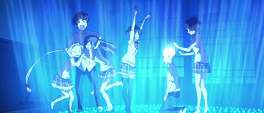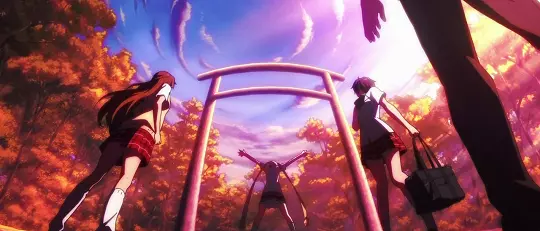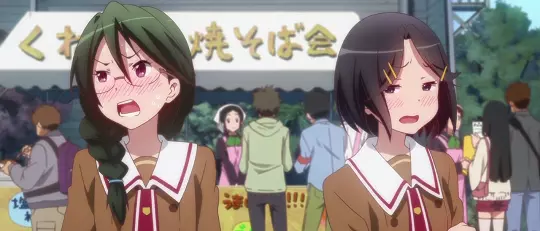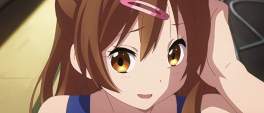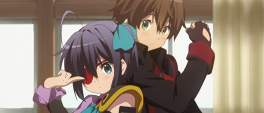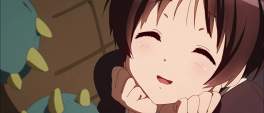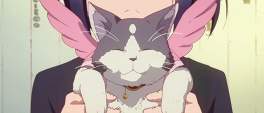Once upon a time there was a girl who had lost her father. Her sister and mother were very upset, but this little girl didn't cry, she refused to believe her father had died. This little girl was Rikka, and she wielded the Wicked Eye: able to summon tremendous dark power; and though she had many minions, her greatest ally was the mysterious Dark Flame Master.
But the Dark Flame Master's powers waned with age and it was up to her Wicked Eye and her devoted minion, Dekomori, to try and save their once great ally and discover the Ethereal Horizon where Rikka's father now resided. There were pretenders, trials and tribulations along the way, and at one point the Wicked Eye lost its vigour all together, but eventually, she prevailed and built a great dark kingdom with her allies.
This is of course not the real story of Chuunibyou Demo Koi ga Shitai! (Even people with adolescent delusions of grandeur want to experience love!), but perhaps one character's interpretation. For only twelve episodes there is a lot packed in, starting congenially enough with the male protagonist Yuuta attempting to stow away his rather eccentric middle-school history and start afresh in highschool. Juxtapose this against Rikka who whole heartedly embraces her fantasy world, and the series sets out to be a familiar tale of accepting your past. Excellent.
More cast members are pulled in with the now all too familiar school club format and it seems that romance is beginning to bud between the two protagonists. Not exactly unexpected and it is handled well enough to at least be entertaining. Interspersed with some spectacular imaginary battles – oversized weapons and technicolour magic effects included – as well as some light comedy and the series seems to be on a gentle, predictable trajectory: Rikka and Yuuta hit it off, she gradually accepts reality. Giggles and ice-cream all round.
But then the melodrama hits. Hard. Putting a screeching halt to the soft-focus summer flippantry of the first half is an exploration of the series' central question: why is Rikka so infatuated, so stubbornly dwelling within her own fantasies? Gone is the bum-bouncing, finger-twirling abandon promised in the epilepsy inducing opening, replaced instead with piano music, endless geysers of tears, and pained expressions as words are traded and hearts broken.
Saying the drama was laid on thick would be an understatement but it at least complicates the otherwise pedestrian resolution the story seemed to be aiming for. Instead there's the conflict between embracing and taming the coldness of reality or fostering the wonderland that is quickly forgotten after childhood. By design the series covers both extremes with muted colours and dejected eyes versus spelunking goth lolis and little girls wielding large weapons with Norse names. It all but forces the audience to pick sides by asking what you would do in Yuuta's position.
It's heartening that the story would step outside the Sunday-afternoon matinee expectations and go full bore with competent, character driven drama. Simultaneously however is distaste at the complete change in tone from the campus romcom the first six episodes did pleasingly, if not spectacularly, well. The situation may be new – the concept of Chuunibyou, or eighth-grader syndrome, was coined only in the last few years – but the ending is carved out by an unsure hand.
A grand gesture, a character reset, and scarce resolution to any of the eleventh hour developments. Even the themes otherwise so lovingly fostered are packaged up and summarised in a final, disembodied narration that is remarkable only in that it is used absolutely nowhere else in the series. It certainly leaves the gates open for further instalments but, to its credit, the climax has a finality that would discourage a serious second offering. A more light-hearted Fumoffu style approach on the other hand?
Who's to say? The humour is certainly inoffensive enough and in the same vein as K-On!'s, replete with a self referential prod towards the light-music club behemoth, but strikes out on its own with underutilised elements like a dog masquerading as Cerberus (two extra heads from cardboard boxes) and the always comical fantasy versus reality magical fights. Secondary characters such as the Janus-like Nubtani or the narcoleptic Kumin could be far better exploited while the magical fights of Dekomori and Rikka are slick and show just what a budget a studio like KyoAni can summon.
Chuunibyou then starts off completely unlike it means to go on. Dividing itself between twee school shenanigans and adorable puppy-love (regardless of the cheesy jazz music that plays during the confession) on one side and affecting drama and poignant themes on another. It's a fine way to hook in then tug on the heart strings of anyone watching and that split may have been cunningly foreshadowed in the opening, just as it hinted at the bifurcation of fantasy and reality that so afflicts Rikka, but it doesn't stop it being any less jarring. Regardless, this is another dependably entertaining series from a studio which can't help but leave indelible fingerprints of quality and care, if no longer universal appeal, all over its productions.


